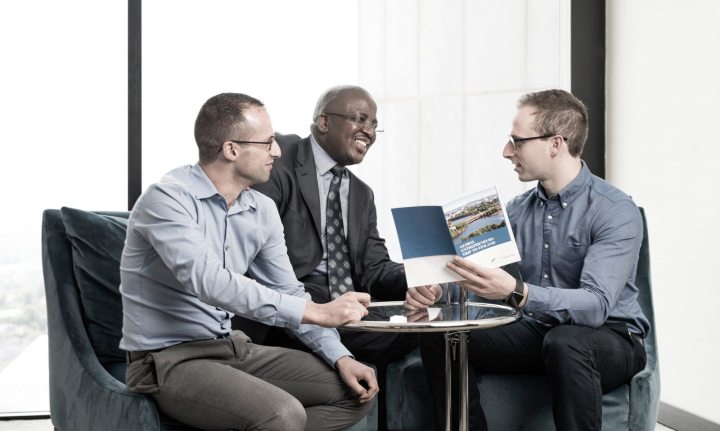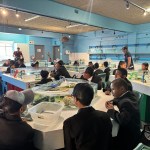Sponsored Content
Fixing SA’s education: Entrepreneurs look to Finland

This year South Africa will spend about R204-billion on education. That’s roughly 20% of our national budget. But what bang do we get for that buck? Barely a fizzle.
A World Economic Forum report ranked SA 139 out of 143 countries for overall quality of education. In Maths and Science, we ranked last. In short, despite government making education a priority, there’s very poor return on the vast sums of money being spent.
It is a challenge about which Investec’s CSI head, Setlogane Manchidi, is all too aware. Poor education directly impacts his chief mandate to help produce active economic participants in society.
“We plough a lot of resources into education,” he says. “We enable people to do well in Maths and Science. We enable people to go to university… but that’s not enough.” Setlogane believes that, in order to produce active participants, entrepreneurship must come into the equation. “There’s a lot to be said around nurturing and stimulating entrepreneurial thinking. And not only thinking but supporting entrepreneurial activity and the growth of SMEs.”
To that end, Investec has partnered with a venture called En-novate that takes small groups of SA entrepreneurs and business professionals on exploration trips to innovation hubs throughout the world. The aim is to expose them to the latest technologies, innovation and best business practices. There’s also a facilitation element to the venture that sees entrepreneurs get advice and information on how to start cross-border businesses.
This month Setlogane and the En-novate founders, Dan Brotman and Natan Pollack, are palpably excited because their next trip provides a perfect opportunity to address South Africa’s dual need for education and entrepreneurship. In fact, their next country of choice offers one of the most widely acclaimed education systems in the world, and the spirit of entrepreneurship thrives there.
I am of course referring to Finland. Out of hundreds of entrants, 20 carefully selected entrepreneurs are jetting off to Helsinki for a week to learn and be inspired to come up with solutions to arguably South Africa’s most pressing challenge. “We believe SA should strive to emulate many of Finland’s approaches to basic education and entrepreneurship,” says Dan.
There are huge discrepancies between South Africa’s and Finland’s schooling systems. In Finland there’s no such thing as a ‘good’ or ‘bad’ school. Parents will never be seen queuing for days, desperate to secure their child a spot in a school that’s deemed decent.
“All schools are equally resourced, with fees, textbooks and nutritious lunches funded by the state through taxes,” explains Dan. And how do they afford all this? Through high taxes. “The highest tax bracket is a whopping 70%, and all its contributors’ salaries are available upon request.”
That seems so foreign to the average South African that it sounds unbelievable. On top of the high amount of tax received, the World Democracy Audit ranks Finland the second least corrupt country in the world.
Other notable differences are in teachers’ pay and how the Finnish tackle early childhood development. “Finnish children only start school at age seven because they believe in playing to learn. Given how important primary education is in later development, I think this is a fascinating approach,” says Setlogane.
Teachers are well paid and are required to hold a master’s degree, rendering the profession competitive.
On the subject of start-up entrepreneurship, Dan lights up when talking about the initiatives the Finnish government has implemented.
“Funding entrepreneurs and creating a business-friendly ecosystem is seen as the public sector’s responsibility, and is not outsourced to the private sector. Entrepreneurs can apply to the state for up to several hundred thousand euros, and are guaranteed an outcome within one month. Compare this to SA, where many young entrepreneurs have to jump through numerous hoops and wait up to a year or longer to receive an outcome from developmental funding agencies.”
While there are numerous lessons that could be gained at governmental level, the real test of whether these overseas trips are effective is in the impact they have on the 20-odd local entrepreneurs fortunate enough to travel to this exciting destination.
“What’s important for us is to get South African entrepreneurs, already working in the education space, to think differently and deeper. We’ve got to expose them to alternative practices, because they will bring them back, identify business opportunities and expand. The networking opportunity is amazing. People have to leave South Africa to meet each other! They spend a week together in a foreign country and work out where there are synergies and opportunities for business collaboration,” comments Setlogane.
Although Finland is wealthy, relatively homogenous and has a much smaller population than South Africa, it is doing many things right, particularly in the spheres of basic education and entrepreneurship. “I would like South African leaders, and the delegates, to see for themselves how a previously poor nation with a mediocre education system and risk-averse attitude towards entrepreneurship can take charge of its future and pivot in the right direction,” says Dan. And if there’s ever a time when South Africa needs to take charge and pivot in the right direction, that time is now.
Want to know more about Investec and En-novate’s trips to innovation hubs throughout the world? Go to www.liveOutoftheOrdinary.com

















 Become an Insider
Become an Insider